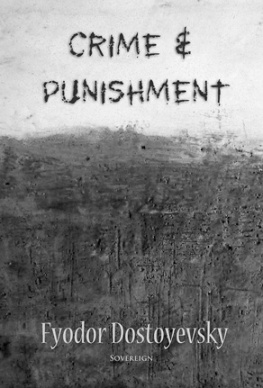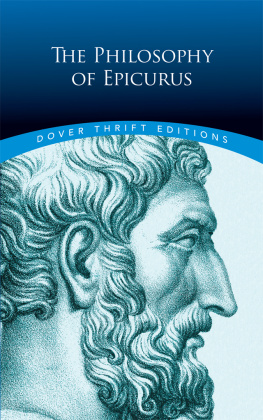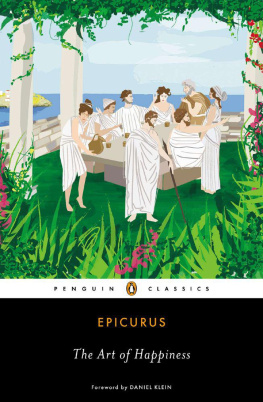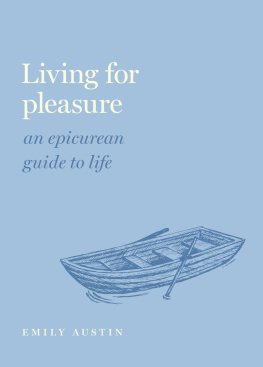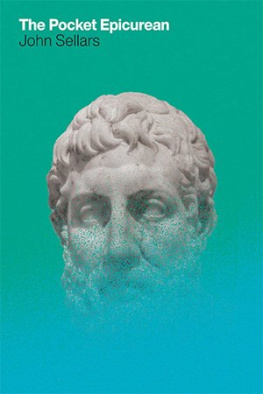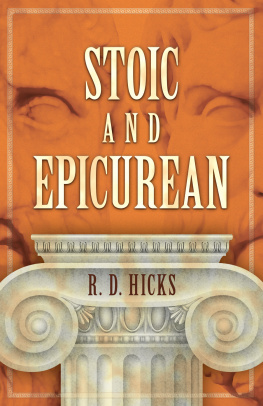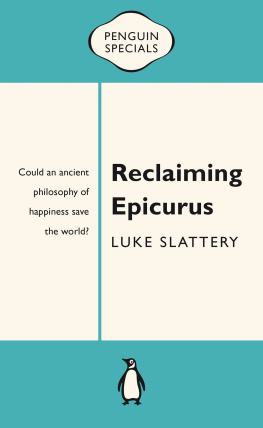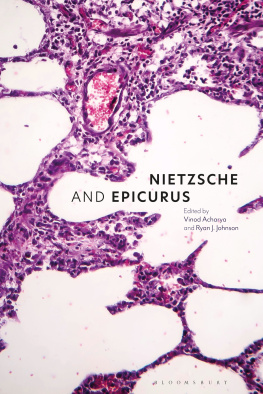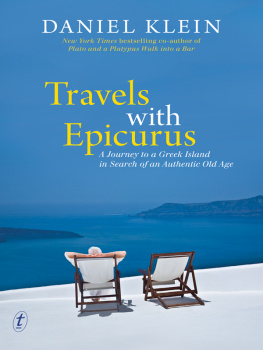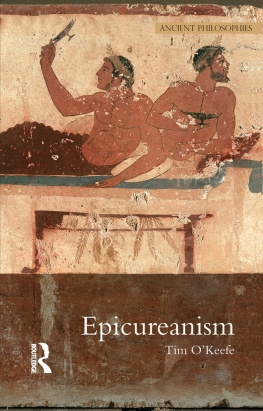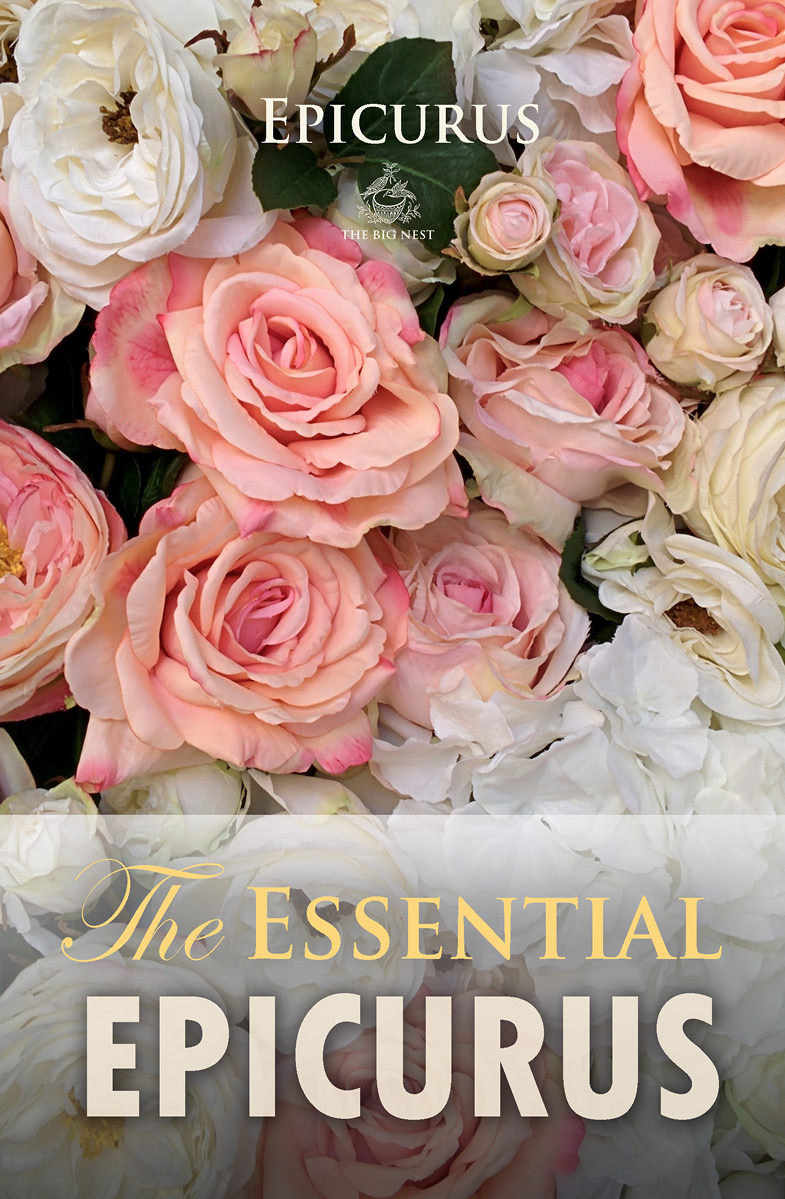
Epicurus
The Essential Epicurus


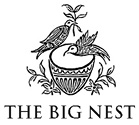
THE BIG NEST
LONDON NEW YORK TORONTO SAO PAULO MOSCOW
PARIS MADRID BERLIN ROME MEXICO CITY MUMBAI SEOUL DOHA
TOKYO SYDNEY CAPE TOWN AUCKLAND BEIJING
New Edition
Published by The Big Nest
sales@thebignest.co.uk
www.thebignest.co.uk
This Edition first published in 2014
Copyright 2014 The Big Nest
Cover design and artwork 2014 Urban-Pic.co.uk
Images and Illustrations 2014 Stocklibrary.org
All Rights Reserved.
ISBN: 9781910343388 (ebk)
ISBN: 9781910343395 (pbk)
Contents
Principal Doctrines
1. A happy and eternal being has no trouble himself and brings no trouble upon any other being; hence he is exempt from movements of anger and partiality, for every such movement implies weakness
2. Death is nothing to us; for the body, when it has been resolved into its elements, has no feeling, and that which has no feeling is nothing to us.
3. The magnitude of pleasure reaches its limit in the removal of all pain. When pleasure is present, so long as it is uninterrupted, there is no pain either of body or of mind or of both together.
4. Continuous pain does not last long in the body; on the contrary, pain, if extreme, is present a short time, and even that degree of pain which barely outweighs pleasure in the body does not last for many days together. Illnesses of long duration even permit of an excess of pleasure over pain in the body.
5. It is impossible to live a pleasant life without living wisely and well and justly, and it is impossible to live wisely and well and justly without living pleasantly. Whenever any one of these is lacking, when, for instance, the person is not able to live wisely, though he lives well and justly, it is impossible for him to live a pleasant life.
6. In order to obtain security from other people any means whatever of procuring this was a natural good.
7. Some people have sought to become famous and renowned, thinking that thus they would make themselves secure against their fellow-humans. If, then, the life of such persons really was secure, they attained natural good; if, however, it was insecure, they have not attained the end which by natures own prompting they originally sought.
8. No pleasure is in itself evil, but the things which produce certain pleasures entail annoyances many times greater than the pleasures themselves.
9. If all pleasure had been capable of accumulation, if this had gone on not only be recurrences in time, but all over the frame or, at any rate, over the principal parts of human nature, there would never have been any difference between one pleasure and another, as in fact there is.
10. If the objects which are productive of pleasures to profligate persons really freed them from fears of the mind, the fears, I mean, inspired by celestial and atmospheric phenomena, the fear of death, the fear of pain; if, further, they taught them to limit their desires, we should never have any fault to find with such persons, for they would then be filled with pleasures to overflowing on all sides and would be exempt from all pain, whether of body or mind, that is, from all evil.
11. If we had never been molested by alarms at celestial and atmospheric phenomena, nor by the misgiving that death somehow affects us, nor by neglect of the proper limits of pains and desires, we should have had no need to study natural science.
12. It would be impossible to banish fear on matters of the highest importance, if a person did not know the nature of the whole universe, but lived in dread of what the legends tell us. Hence without the study of nature there was no enjoyment of unmixed pleasures.
13. There would be no advantage in providing security against our fellow humans, so long as we were alarmed by occurrences over our heads or beneath the earth or in general by whatever happens in the boundless universe.
14. When tolerable security against our fellow humans is attained, then on a basis of power sufficient to afford supports and of material prosperity arises in most genuine form the security of a quiet private life withdrawn from the multitude.
15. Natures wealth at once has its bounds and is easy to procure; but the wealth of vain fancies recedes to an infinite distance.
16. Fortune but seldom interferes with the wise person; his greatest and highest interests have been, are, and will be, directed by reason throughout the course of his life.
17. The just person enjoys the greatest peace of mind, while the unjust is full of the utmost disquietude.
18. Pleasure in the body admits no increase when once the pain of want has been removed; after that it only admits of variation. The limit of pleasure in the mind, however, is reached when we reflect on the things themselves and their congeners which cause the mind the greatest alarms.
19. Unlimited time and limited time afford an equal amount of pleasure, if we measure the limits of that pleasure by reason.
20. The body receives as unlimited the limits of pleasure; and to provide it requires unlimited time. But the mind, grasping in thought what the end and limit of the body is, and banishing the terrors of futurity, procures a complete and perfect life, and has no longer any need of unlimited time. Nevertheless it does not shun pleasure, and even in the hour of death, when ushered out of existence by circumstances, the mind does not lack enjoyment of the best life.
21. He who understands the limits of life knows how easy it is to procure enough to remove the pain of want and make the whole of life complete and perfect. Hence he has no longer any need of things which are not to be won save by labor and conflict.
22. We must take into account as the end all that really exists and all clear evidence of sense to which we refer our opinions; for otherwise everything will be full of uncertainty and confusion.
23. If you fight against all your sensations, you will have no standard to which to refer, and thus no means of judging even those judgements which you pronounce false.
24. If you reject absolutely any single sensation without stopping to discriminate with respect to that which awaits confirmation between matter of opinion and that which is already present, whether in sensation or in feelings or in any immediate perception of the mind, you will throw into confusion even the rest of your sensations by your groundless belief and so you will be rejecting the standard of truth altogether. If in your ideas based upon opinion you hastily affirm as true all that awaits confirmation as well as that which does not, you will not escape error, as you will be maintaining complete ambiguity whenever it is a case of judging between right and wrong opinion.
25. If you do not on every separate occasion refer each of your actions to the end prescribed by nature, but instead of this in the act of choice or avoidance swerve aside to some other end, your acts will not be consistent with your theories.
26. All such desires as lead to no pain when they remain ungratified are unnecessary, and the longing is easily got rid of, when the thing desired is difficult to procure or when the desires seem likely to produce harm.
27. Of all the means which are procured by wisdom to ensure happiness throughout the whole of life, by far the most important is the acquisition of friends.

